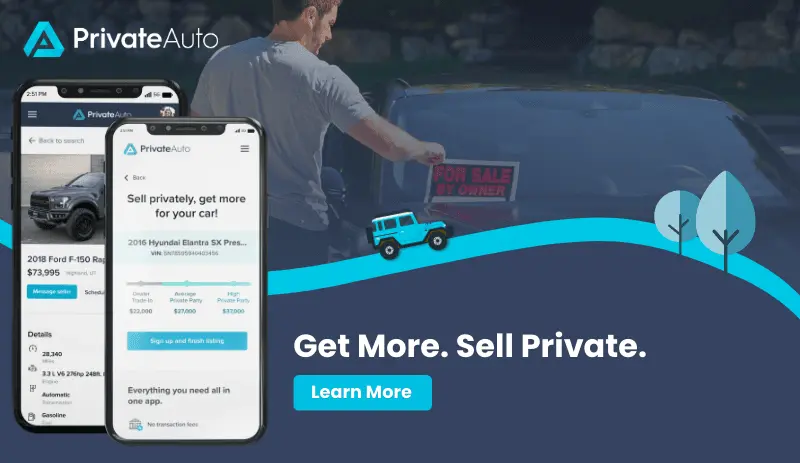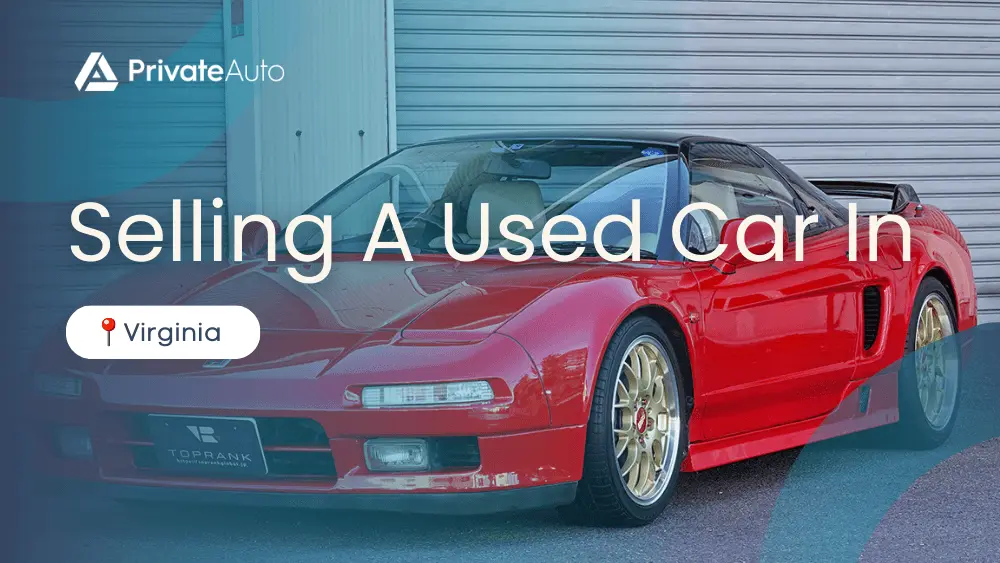Whether you’re thinking about selling your car to a dealer or listing it as a private seller, Virginia residents need to consider the unique state requirements. Here’s a closer look at what Virginia requires from private car sellers.
Can You Sell a Car Privately in Virginia?

The Basics of Selling a Car Privately
- The title is a legal document and you’ll need to have it on hand. If you don’t have the title, submit a lost or stolen title form to recover it before the sale.
- When writing on the title’s transfer of ownership lines, always use black or blue ink. Errors or white-out may void the document, so be careful.
- Both parties should use their full legal names on any and all paperwork. Current physical addresses should also be given, along with a current mailing address (if different).
1. Gather the Vehicle’s Documentation
You’ll want the title in hand before the sell. If you’ve lost the car’s title or it has been stolen, you must submit an Application for Replacement of Substitute Title, or Form VSA 67. If you have inherited the car, you will need the owner’s certified death certificate and a copy of the will, along with Form VSA 24 (Authority to Transfer Virginia Title Certification). If you are a joint owner and the co-owner is deceased, you may apply for a substitute title that removes the co-owner’s name. Fees will vary depending on the situation.
In addition to the title, you’ll also need a valid emission inspection for gasoline-powered vehicles less than 25 years of age and diesel-powered vehicles from 1997 or newer. This only applies to cars registered in Arlington, Fairfax, Loudoun, Prince William, and Stafford counties and the cities of Alexandria, Fairfax, Falls Church, Manassas, and Manassas Park. Cars manufactured in the current model year or during the three preceding model years are exempt from a biennial emission inspection, and so are most hybrids. All hybrids are subject to the On-Road Emissions Program.
2. Prepare the Transfer Paperwork
If your vehicle is more than five years old, then both the buyer and seller must attest to the final sales price with the bill of sale form, also known as the Vehicle Price Certification. The state provides a template, but Virginia will accept any bill of sale (even a completely handwritten document) so long as it contains the right information. You can choose to notarize the bill of sale, but it’s not necessary.
3. Remove Your License Plates
4. Cancel Your Insurance
You should also contact your DMV by going online or calling up a local office. Notify them that you’ve sold the car so they can ensure that’s reflected in their records. This is important because your insurance company will notify the DMV when insurance coverage is cancelled, and they will try to penalize you or even suspend your license for not having insurance if they don’t know you no longer have the car.
Get Cash-in-Hand Faster
When you list with PrivateAuto, you’ll unlock all of the resources you need to get cash-in-hand faster — like a window brochure that you can print out to advertise your vehicle locally. Listing with us is fast, fun, and is completely free of obligation. Our goal is to help you sell your car in a simpler, safer, and streamlined way. Ready to get started? List your car now.
Why a Virginia Private Car Sale is Better
Why a Virginia Private Car Sale is Better
You can typically get a higher price for your car in the private market than they do from a Virginia dealership trade-in. That’s because dealerships need to make a spread: they buy low and sell high.
Unfortunately, selling your vehicle on the private market has always been a cumbersome process, in Virginia and throughout the US. Until now.
How PrivateAuto Helps You Sell Your Car in Virginia
How PrivateAuto Helps You Sell Your Car in Virginia
- Full banking integration for instant money transfers, 24/7/365
- Verified buyer funds presale so you don’t waste your time
- Makes selling a vehicle (and getting paid) quick, easy, and secure

Selling your Car on PrivateAuto
Selling your Car on PrivateAuto: the Process
Here’s how the PrivateAuto selling process works:
1. You register on PrivateAuto and we verify you
2. You list your car model with our easy step-by-step guided process
3. You set your terms and screen would-be buyers
4. You vet incoming offers and choose a buyer
5. You and the buyer e-sign documents from your PrivateAuto phone app
6. You get paid, instantaneously
So easy.
Are you interested in buying a car in Tennessee instead? Look through our used cars for sale.
Frequently asked questions when selling your car in Virginia
Selling a Car in Virginia FAQ
What paperwork do I need to sell my car privately in Virginia?
Every state has its own documentation requirements for selling a used car. Luckily for you, PrivateAuto helps you keep track of all needed paperwork requirements with our step-by-step in-app process.
You will need the following paperwork to sell your car in Virginia:
– Warranty documents
– Service documents
– Bill of sale
– Car title and registration documents
– Vehicle identification number
– Car insurance documents
PrivateAuto guides you through the selling process, so you never risk forgetting about a document you need to make the sale.
How do I sell a car to an individual in Virginia?
To sell a car privately to an individual in Virginia, take the following steps:
1. Create a PrivateAuto account
2. Create a listing for your vehicle
3. Set location preferences
4. Accept or reject offers—or make counter-offers—right from our app
5. Schedule test drives from our in-app scheduling and messaging feature
6. Sell and get paid instantly
Can you sell a car without a title in Virginia?
No, you cannot legally transfer ownership of a car in Virginia, without a title. If your car’s title has been lost or damaged, you can request a duplicate.
Who pays the sales tax on a used car?
The buyer is responsible for paying for the used vehicle sales tax once they purchase the car. As a seller, once you transfer the title to the new owner, you are no longer responsible for paying any taxes for the vehicle.
What is the safest method of payment when selling a car?
Typically, the safest payment method when selling a car is cash. However, if you’re selling on PrivateAuto, you also have the option to receive the payment through our secure PrivateAuto Pay integrated banking system.
By receiving your money through our integrated banking system, both buyers and sellers can stay safe while exchanging large sums of money, as they don’t have to share their contact or banking information during the car buying process.
How to protect yourself when selling a car privately?
To protect yourself when selling a car privately, we recommend the following practices:
1. Don’t give out your contact information
2. Verify that the buyer has the funds to purchase the vehicle
3. Deal with verified buyers only
4. Receive the payment through PrivateAuto Pay
The best way to protect yourself when selling a car privately is by selling on a secure website that offers these features (such as PrivateAuto).
